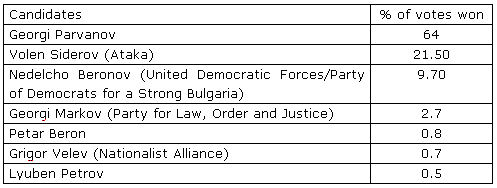Results
News
Corinne Deloy,
Fondation Robert Schuman,
Helen Levy
-

Available versions :
EN

Corinne Deloy
Fondation Robert Schuman
Helen Levy
It was without surprise that Georgi Parvanov, outgoing President of the Republic, won the second round of the presidential election that took place on 29th October winning 75.90% of the vote, an unprecedented result since the fall of Communism. His rival extreme rightwing ultranationalist Volen Siderov (Ataka), who insisted throughout the campaign on calling the outgoing President "Gotse" the pseudonym that featured on his informer file, won 24.01% of the vote.
The outgoing President easily won the first round on 22nd October with 64% of the vote but the low participation rate (42.51%) did not enable the election to be validated since the electoral law makes the vote by at least half of the registered electorate obligatory in the first round of the presidential election.
In the second round 41.20% of Bulgarians fulfilled their civic duty, a slightly lower figure than that recorded on 22nd October last. According to the pollster NCIOM the Gypsy minority, that has come under attack by Volen Siderov showed significant mobilisation. The institute announced that at least 55,000 Bulgarian Turks, another minority that is regularly attacked by the ultranationalist leader fulfilled their civic duty, a record in the country's history.
"We won because we were the best. The result was what we expected," declared the President of the Republic when the results were announced. "Our foreign policy will remain as responsive, dependable and effective as it has been until now and our priority will be ensuring Bulgaria's dignified entry into the European Union," he said immediately. "It is a great victory of reason that illustrates the wisdom of the Bulgarian people. We have shown that we are a people of Europe," stressed Roumen Petkov, Home Minister. "On 29th October 80% of the electorate voted against Volen Siderov and not for Georgi Parvanov," analysed however André Raïtchev of Gallup.
Volen Siderov said he was satisfied with his result. "We doubled our result in comparison with the general election (8.16% of the vote). It is a good result for us, given that the entire State machine; the press, the pollsters, even the police were mobilised against us. I lost against a rival of disproportionate strength who had the support of nearly all the other parties," he maintained on the TV channel BTV adding, "we shall work towards having early general elections. The parliamentary majority works for the Mafia."
Defeated in the first round of the election (their candidate Nedelcho Beronov won 9.70% of the vote) the leaders of the rightwing parties – United Democratic Forces (ODS) and the Party of Democrats for a Strong Bulgaria had said that they would not say anything with regard to the second round of the presidential election and this in spite of appeals from Hans-Gert Pöttering chairman of the parliamentary group of the European Popular Party (PPE-DE), to support the outgoing President of the Republic, Georgi Parvanov. Nedelcho Beronov refused to provide any voting instructions. On the other hand the National Simeon II Movement (MNS II), a member of the present government coalition led by Prime Minister Serguei Stanichev (BSP), called to vote in favour of Georgi Parvanov.
49 year-old Georgi Parvanov who comes from Sirichtnick (south west of the country) trained as a historian. He joined the Communist Party in 1981 (BKP) and worked at the Institute of History of the Communist Party. In 1994 he became the deputy chairman of the Socialist Party (BSP) the BKP's successor in April 1990 before being elected chairman in December 1996 within a difficult context; Prime Minister Jan Videnov (BSP) had been leading the country and was forced to resign in January 1997 in the wake of a major political-economic crisis and violent demonstrations. Re-elected by a wide majority as head of the Socialist Party in 1998 and 2000 Georgi Parvanov was elected rather unexpectedly as President of the Republic on 18th November 2001 with 54.01% of the vote versus 45.90% for his adversary, outgoing President Petar Stoyanov, the present leader of the United Democratic Forces.
In 2003 when the Anglo-American attack on Iraq started the President, whose country was then a member of the UN Security Council, adopted the stance taken by both France and Germany accepting however the dispatch of a Bulgarian military contingent to Iraq. Abroad Georgi Parvanov has succeeded in calming his country's relations with its Russian neighbour.
The outgoing President of the Republic refused all debate with his adversary Volen Siderov between the two rounds, "in respect of the presidential institution," he maintained. He also said that the victory was "a necessary step in order to cleanse the country's image. It is not a vote on a road we have already travelled but a vote on the road we still have to travel. Starting everything from zero would have been a reckless adventure. Bulgaria needs the type of patriotism that unites instead of dividing," he maintained when concluding his electoral campaign.
On 29th October Georgi Parvanov, who will take office again on 22nd January became the first President of the Republic of Bulgaria to be re-elected after the collapse of the Communist regime. As during his first term in office his deputy will be Angel Marin.
Results of the Second Round of the Presidential Election on 29th October in Bulgaria
Participation rate: 41.20%
 Source Bulgarian National Electoral Commission
Source Bulgarian National Electoral CommissionOn the same theme
To go further
Elections in Europe
Corinne Deloy
—
17 December 2024
Elections in Europe
9 December 2024
Elections in Europe
Corinne Deloy
—
3 December 2024
Elections in Europe
Corinne Deloy
—
3 December 2024

The Letter
Schuman
European news of the week
Unique in its genre, with its 200,000 subscribers and its editions in 6 languages (French, English, German, Spanish, Polish and Ukrainian), it has brought to you, for 15 years, a summary of European news, more needed now than ever
Versions :




